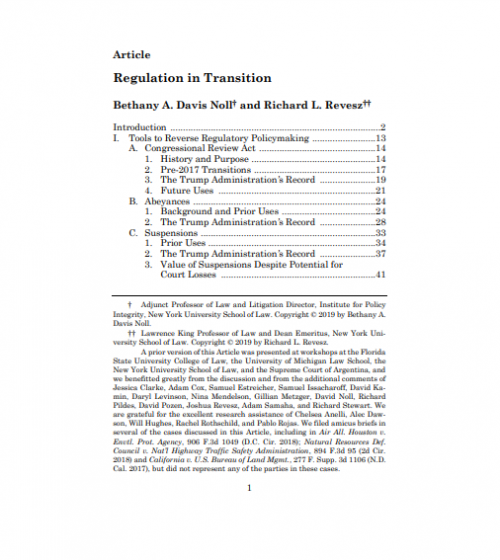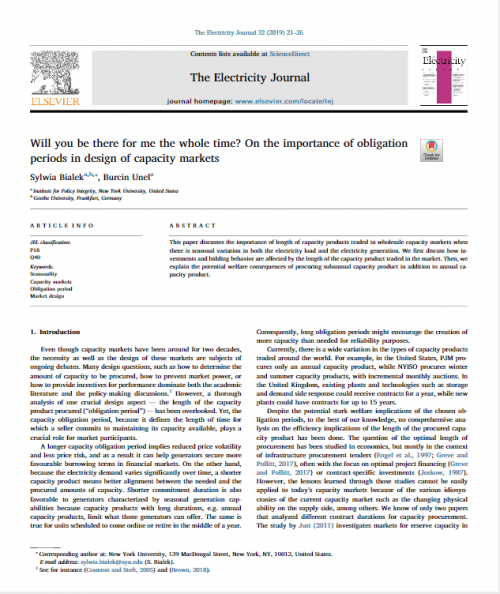-
New Tracking Resource: Health and Environmental Benefits Threatened by Deregulation
Our new tracking resource tallies the benefits to public health and the environment that are at risk due to regulatory repeals, delays, and revisions. Since 2017, numerous environmental rules have been the subject of the Trump administration’s deregulatory agenda. The original rules highlighted in our document were economically justified, meaning each was supported by a detailed account of its monetized benefits to the American public, which outweighed projected costs. Now, as the administration works to undo these rules, a wide range of crucial benefits could be lost. Our resource provides information on the kinds of benefits at risk, monetized gross and net benefit estimates, and other unquantified health and environmental effects of several federal rules.
-
Comments to BLM on Oil and Gas Leasing in the Arctic National Wildlife Refuge
The Bureau of Land Management (BLM) recently prepared a Draft Environmental Impact Statement (DEIS) for an oil and gas leasing plan within the Arctic National Wildlife Refuge (ANWR) Coastal Plain. We submitted comments explaining how fossil fuel extraction in ANWR would pose serious threats to a delicate ecosystem and would contribute significantly to climate change. Our criticism of the DEIS focuses on the methodological flaws in BLM’s analysis and their failure to consider viable leasing alternatives.
-
Regulation in Transition
This article, published in the Minnesota Law Review, identifies a new trend in aggressive regulatory rollbacks and argues that it is likely to become an enduring feature of American politics. Rather than stick to the typical deregulatory playbook, President Trump has made aggressive use of other instruments that had not previously played a significant role. Through these strategies, the Trump administration was able to reach a far greater proportion of regulations finalized during Obama’s presidency than would have been possible under prior practices. In the current climate, aggressive rollback strategies will lead to an important reconceptualization of the Executive Branch, in which future one-term presidents are unlikely to see a significant portion of their regulatory output on important matters survive and the incentives that presidents face in fashioning their regulatory policies will be significantly different. The changing incentives will affect a broad set of decisions, from transition planning for an incoming administration to the timing of regulatory actions relative to a president’s reelection campaign.
-
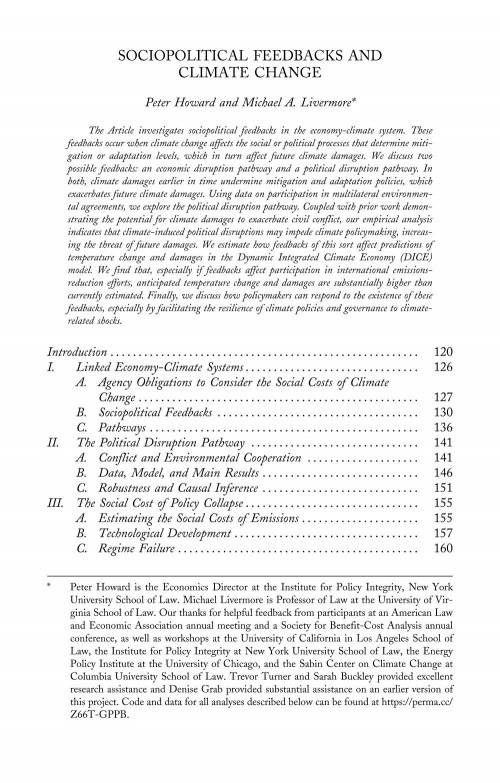
Sociopolitical Feedbacks and Climate Change
This article, published in the Harvard Environmental Law Review, investigates sociopolitical feedbacks in the economy-climate system. These feedbacks occur when climate change affects the social or political processes that determine mitigation or adaptation levels, which in turn affect future climate damages. Two possible feedbacks are an economic disruption pathway and a political disruption pathway. In both, climate damages earlier in time undermine mitigation and adaptation policies, which exacerbates future climate damages. Using data on participation in multilateral environmental agreements, the article explores the political disruption pathway.
-
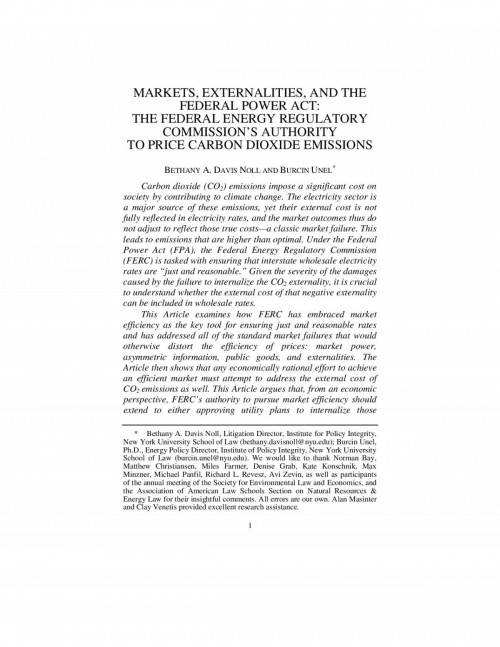
Markets, Externalities, and the Federal Power Act
The Federal Energy Regulatory Commission’s Authority to Price Carbon Dioxide Emissions
This article, published in the New York University Environmental Law Journal, shows how the Federal Energy Regulatory Commission (FERC) must attempt to address the external cost of carbon dioxide (CO2) emissions to achieve an efficient electricity market. CO2 emissions impose a significant cost on society by contributing to climate change. The electricity sector is a major source of these emissions, yet their external cost is not fully reflected in electricity rates, and the market outcomes thus do not adjust to reflect those true costs—a classic market failure. This leads to emissions that are higher than optimal.
-
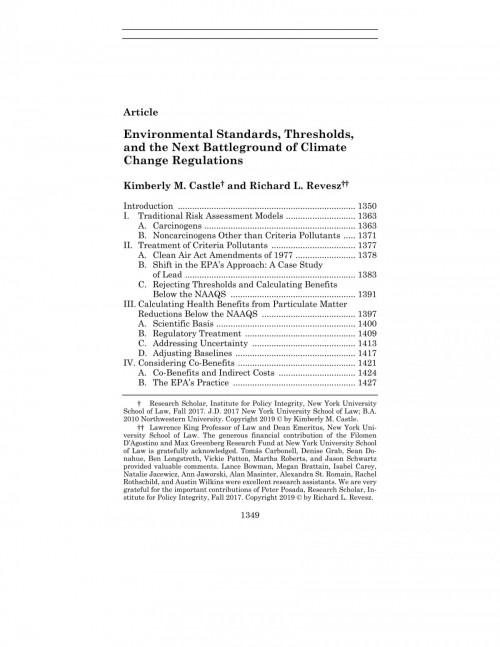
Environmental Standards, Thresholds, and the Next Battleground of Climate Change Regulations
This article, published in the Minnesota Law Review, addresses a central battleground of the debate about the future of greenhouse gas regulations: the valuation of particulate matter reductions that accompany reductions in carbon dioxide emissions. The benefits from particulate matter reductions are substantial for climate change rules, accounting for almost one half of the quantified benefits of the Obama Administration’s Clean Power Plan. These benefits are also significant for regulations of other air pollutants, making this issue one of far-reaching importance for the future of environmental protection.
-
Comments on New Jersey Rejoining the Regional Greenhouse Gas Initiative
New Jersey is proposing a new state carbon emissions trading program, which means it will rejoin the Regional Greenhouse Gas Initiative (RGGI). RGGI is a cooperative effort among northeastern states to reduce carbon emissions from the electric power sector through allowance trading. New Jersey previously left the initiative in 2011. RGGI expansion promises several benefits, such as improved market efficiency, increased competitiveness, and lower carbon reduction costs. We submitted comments to both RGGI and New Jersey on how to best reintegrate the state.
-
Will You Be There for Me the Whole Time?
On the Importance of Obligation Periods in Design of Capacity Markets
This paper discusses how variations in the availability of various resources (generation seasonality) and the fluctuations in the electricity usage (load seasonality) relate to efficient capacity market design. Even though capacity markets have been around for two decades, the necessity as well as the design of these markets are subjects of ongoing debates. Many design questions, such as how to determine the amount of capacity to be procured, how to prevent market power, or how to provide incentives for performance dominate both the academic literature and the policymaking discussions. Another design aspect that plays a crucial role for market participants is the length of the capacity product procured (“obligation period”), because it defines the length of time for which a seller commits to maintaining its capacity available. However, a thorough analysis of obligation periods has been overlooked by literature and policymaking discussions. Our article works to provide this analysis.
-
Comments to FERC on NYISO and Energy Storage Resources
A new wholesale energy market policy proposal in New York could undermine market efficiency by limiting the compensation available for energy storage resources. The New York Independent System Operator (NYISO) recently submitted changes to its market rules to encourage energy storage, as required by an order from the Federal Energy Regulatory Commission (Order No. 841). The filing prevents energy storage resources from participating in the wholesale markets if they also participate in retail compensation programs. We submitted comments explaining how this participation barrier is inconsistent with FERC’s requirements and should be changed.
-
Comments to FERC on Adelphia Gateway Pipeline Project
The Federal Energy Regulatory Commission (FERC) recently released an Environmental Assessment (EA) for the Adelphia Gateway Project. FERC quantifies nearly 90,000 tons per year of direct carbon dioxide-equivalent emissions, but offers no meaningful analysis of the pipeline’s climate impacts. We submitted joint comments urging FERC to better weigh the significance of project’s impacts using the social cost of greenhouse gases methodology.




